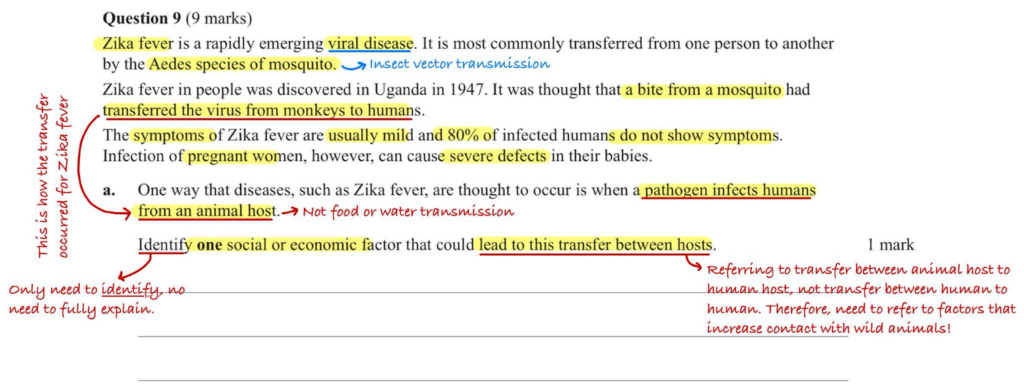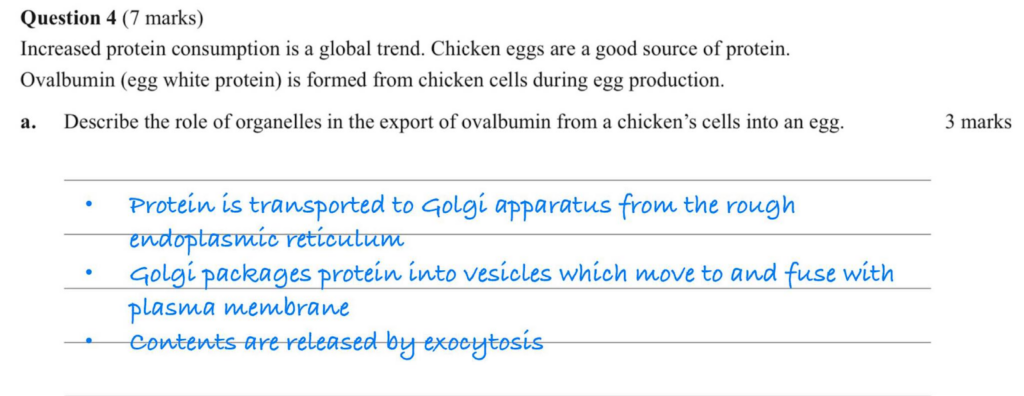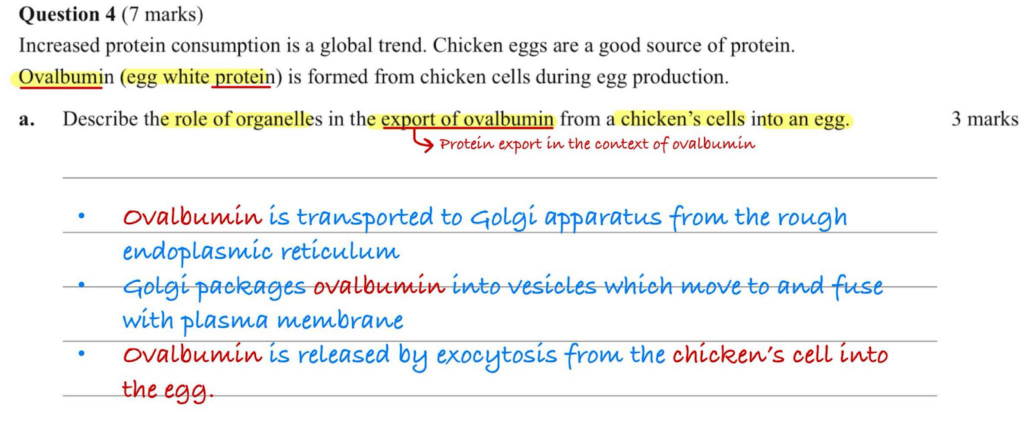Hi there! My name is Daniela and I am a VCE Biology and Math Methods tutor on Learnmate. I graduated from John Monash Science School with an ATAR of 98.85 and scaled study scores of 49 for Biology and Math Methods, also achieving 45+ in Chemistry and Physics. I’ve been a passionate tutor for the past 3 years and I’m here to provide you insight into how to set yourself up for success in VCE!
Navigating short answer questions in VCE Biology is a common struggle for all students. It requires a tactical approach to ensure both efficiency and accuracy in your responses. Let's delve into the key strategies that can help you not only answer questions more effectively but also showcase a deeper understanding of the subject.
Dot Points: A Shortcut to Clarity
Many students don’t know that you can answer in dot point format in your VCE SACs and exams, even more, students don't know that this is the preferred method of answering questions. Incorporating dot points in your responses is like providing a roadmap for both you and the examiner. By adopting this format, you enhance the clarity of your answers for your examiner, allowing for a quick and efficient assessment of your understanding. The succinct nature of dot points also helps you organise your thoughts, prioritising key information to create focused and well-structured responses. Overall, dot points are how you save time and also ensure that you are hitting only the key points!
Highlight and Annotate: Unveiling Context
Highlighting and annotating the question is more than just a superficial step; it's a method to uncover the context of the question and understand what is being asked! This process assists in extracting essential details that might otherwise be overlooked. Understanding the context is crucial for tailoring your response to the specific nuances of the question, showcasing not only your knowledge but also your ability to apply it in different scenarios. Furthermore, highlighting and annotating the question allows you to answer what is being asked and avoids misunderstanding. Below is an example of how you could do this:
Context Matters: Apply Your Knowledge
Avoiding generic responses and applying your knowledge in a contextual manner is key to demonstrating a deeper understanding of the subject. When the question refers to a specific topic, such as influenza, do not just regurgitate information you know, specifically refer to the influenza and how it relates to the question. This showcases your ability to connect theoretical knowledge to real-world scenarios and is what is required to get all the marks! Here is an example that shows the difference between not using and using the context that was given.
Not using the context:
Using the context of the question:
Avoid Redundancy: Skip Restating
Do not restate information that was given to you in the question. The examiners/your teachers are not looking for you to re-word what they have already told you, they are wanting to assess your understanding and application. If you find yourself just restating information in the question, there is a good chance that you have misunderstood what the question is asking you! Furthermore, it wastes your time and space during your SAC or exam. Time efficiency is crucial in an exam setting, allowing you to dedicate more energy to expanding on key points rather than repeating information. Moreover, efficient space utilisation ensures that your responses are concise, impactful, and directly address the question at hand.
Re-Read the Question First: Prevent Misinterpretation
Re-reading the question before reviewing your answer might seem like a small step, but it's a powerful one. This practice minimizes the chances of misinterpretation, ensuring that your response aligns precisely with the examiner's expectations. Many students will only read over their answers when checking their work, however, it is much more likely that you made a mistake reading the question rather than what you actually wrote. You can also apply this when you are reading a question for the first time, you should always re-read the final question before you start writing to ensure that you understand what is being asked of you!
Plan for Success: Strategise Your Answer
Planning your responses for 3-4 mark questions before writing not only prevents unnecessary rambling but also ensures a logical and coherent flow in your answers. This strategic approach allows you to outline key points, providing a roadmap for your response and helping you stay focused on addressing all essential components of the question. Furthermore, it often helps you to understand and breakdown a complex question as you are planning it out.
Time-Pressured Practice
Practicing short answer questions under time pressure is a realistic simulation of exam conditions. Adhering to the general rule of allocating a minute per mark, with an extra minute for questions with more reading, helps you develop a time management strategy. This drill prepares you for the pacing required during the actual exam, preventing time-related stress and ensuring that you allocate sufficient time to each question.
Blank Spaces? Fill Them Strategically
Leaving no question blank, even when faced with a challenge, is a strategic decision. Instead of letting a difficult question disrupt your flow, jot down a few key points using the provided context and move on. This tactic maintains your momentum, ensuring that you allocate time to all questions and maximise your chances of scoring well. Do not let yourself get trapped and thrown-off with a complex question. First try everything listed above, but if you’re still stuck, it is essential to keep moving.
Conclusion
In conclusion, mastering short answer questions in VCE Biology is about adopting strategic approaches that prioritize clarity, context utilization, and precise planning. Integrating these strategies into your exam preparation will not only help you answer questions more effectively and confidently but also showcase a comprehensive understanding of the subject matter. Happy studying!
This blog is the second in a series dedicated to uncovering the essential skills and strategies necessary to succeed this year in VCE Biology. You can read the first part of the series here. Stay tuned for future blogs in this series as we continue to dive deeper into this subject, aiming to equip you with a comprehensive toolkit for success.
Need a little extra support or a confidence boost in VCE Biology? Explore more expert tips and resources and connect with former top-performing student tutors and qualified teachers at Learnmate to start working towards achieving your potential. Share this guide with your peers to ensure you all succeed today!
This blog was written by Daniela L, a VCE Biology and VCE Maths Methods Tutor on Learnmate. Daniela is tutoring while studying a Bachelor of Advanced Science Research at Monash University. She graduated with a 98.85 ATAR, 45+ study scores in 4 subjects and has been supporting other students achieve their goals through tutoring for over 3 years.
You can view her profile and, subject to her availability, request Daniela as your tutor here.







